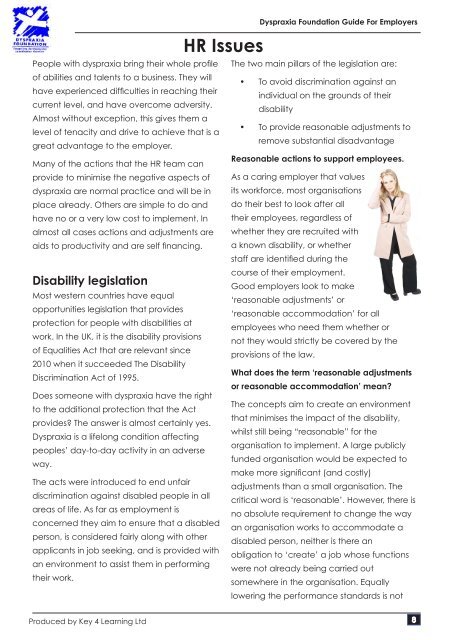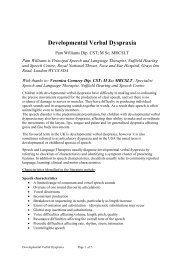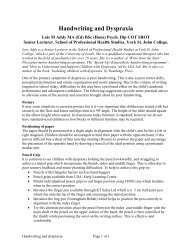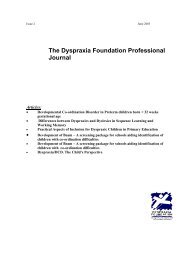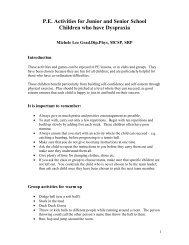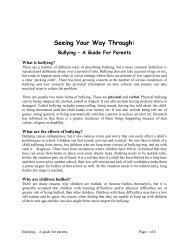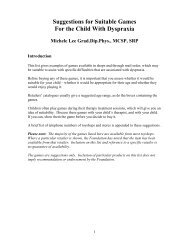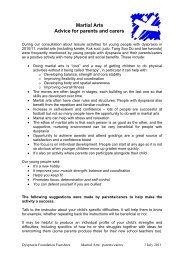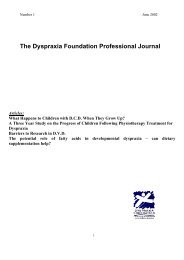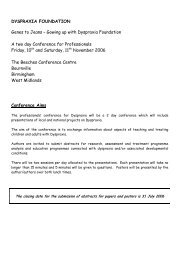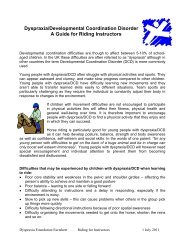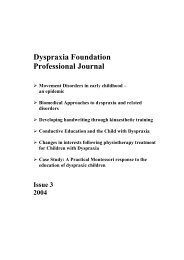Employers Guide - Dyspraxia Foundation
Employers Guide - Dyspraxia Foundation
Employers Guide - Dyspraxia Foundation
Create successful ePaper yourself
Turn your PDF publications into a flip-book with our unique Google optimized e-Paper software.
Disability legislation<br />
Most western countries have equal<br />
opportunities legislation that provides<br />
protection for people with disabilities at<br />
work. In the UK, it is the disability provisions<br />
of Equalities Act that are relevant since<br />
2010 when it succeeded The Disability<br />
Discrimination Act of 1995.<br />
Does someone with dyspraxia have the right<br />
to the additional protection that the Act<br />
provides? The answer is almost certainly yes.<br />
<strong>Dyspraxia</strong> is a lifelong condition affecting<br />
peoples’ day-to-day activity in an adverse<br />
way.<br />
The acts were introduced to end unfair<br />
discrimination against disabled people in all<br />
areas of life. As far as employment is<br />
concerned they aim to ensure that a disabled<br />
person, is considered fairly along with other<br />
applicants in job seeking, and is provided with<br />
an environment to assist them in performing<br />
their work.<br />
HR Issues<br />
<strong>Dyspraxia</strong> <strong>Foundation</strong> <strong>Guide</strong> For <strong>Employers</strong><br />
People with dyspraxia bring their whole profile The two main pillars of the legislation are:<br />
of abilities and talents to a business. They will<br />
have experienced difficulties in reaching their<br />
current level, and have overcome adversity.<br />
Almost without exception, this gives them a<br />
level of tenacity and drive to achieve that is a<br />
great advantage to the employer.<br />
•<br />
•<br />
To avoid discrimination against an<br />
individual on the grounds of their<br />
disability<br />
To provide reasonable adjustments to<br />
remove substantial disadvantage<br />
Many of the actions that the HR team can<br />
provide to minimise the negative aspects of<br />
dyspraxia are normal practice and will be in<br />
place already. Others are simple to do and<br />
have no or a very low cost to implement. In<br />
almost all cases actions and adjustments are<br />
aids to productivity and are self financing.<br />
Reasonable actions to support employees.<br />
As a caring employer that values<br />
its workforce, most organisations<br />
do their best to look after all<br />
their employees, regardless of<br />
whether they are recruited with<br />
a known disability, or whether<br />
staff are identified during the<br />
course of their employment.<br />
Good employers look to make<br />
‘reasonable adjustments’ or<br />
‘reasonable accommodation’ for all<br />
employees who need them whether or<br />
not they would strictly be covered by the<br />
provisions of the law.<br />
What does the term ‘reasonable adjustments<br />
or reasonable accommodation’ mean?<br />
The concepts aim to create an environment<br />
that minimises the impact of the disability,<br />
whilst still being “reasonable” for the<br />
organisation to implement. A large publicly<br />
funded organisation would be expected to<br />
make more significant (and costly)<br />
adjustments than a small organisation. The<br />
critical word is ‘reasonable’. However, there is<br />
no absolute requirement to change the way<br />
an organisation works to accommodate a<br />
disabled person, neither is there an<br />
obligation to ‘create’ a job whose functions<br />
were not already being carried out<br />
somewhere in the organisation. Equally<br />
lowering the performance standards is not<br />
Produced by Key 4 Learning Ltd


